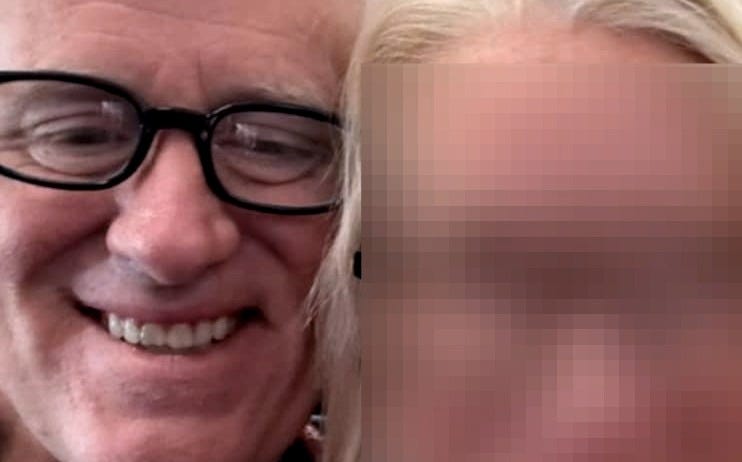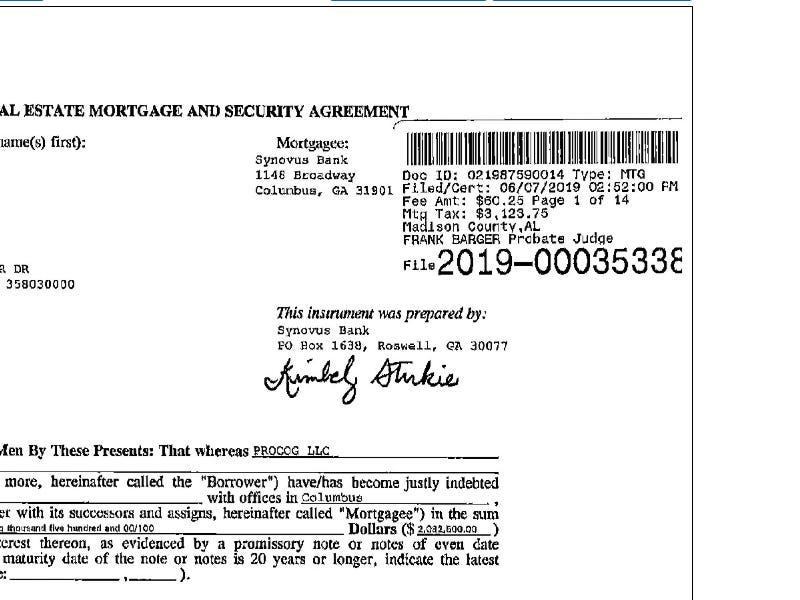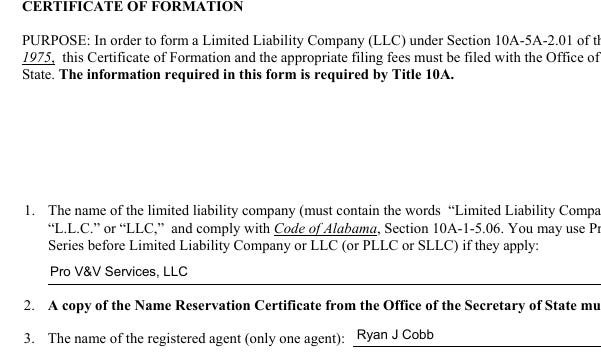A Private Bank Has More Legal Rights to Lab That Certifies Voting Machines Than the U.S. Government
Follow the Money: Probate Filings and Bank Documents Expose the Real Owners of Election Certification
With all the talk of election integrity, almost no one asks who certifies the machines. Who approves the firmware, signs off on the software, or decides whether your vote is actually recorded the way you cast it?
The answer, a lot of the time, is Ryan Jackson Cobb (a.k.a Jack Cobb) and his lab, Pro V&V.
He’s not a government employee. He doesn’t report to Congress. He doesn’t answer to voters. But for over a decade, he’s sat atop the most powerful, least scrutinized bottleneck in American democracy — the certification of our voting machines.
And once you start following the paperwork you begin to see the truth. Cobb built this empire through private equity filings, shell corporations, real estate deals, and silent corporate restructurings. He didn’t just stumble into this role. He engineered it, and he’s been consolidating that power in ways no one has documented … until now.
This article unpacks Jack Cobb’s financial web, the role Synovus Bank plays in it, and what it all reveals.

How Jack Cobb Got Power Over Your Vote
First time here? Let me catch you up. If not, you can endure the recap or jump to the good stuff in the next section.
Jack Cobb is the founder and director of Pro V&V, Inc., one of only two (yes, two) federally certified testing labs in the United States tasked with testing and approving the machines that count our votes on election day. These labs are formally known as VSTLs, or vote system testing labs.
So, these VSTLs, they are supposed to be the gatekeepers of democracy. No voting machine can be used in a U.S. election without first being approved by them and yet the process is neither transparent nor meaningfully accountable. It’s not even our government doing the certifying. It’s two private, for-profit businesses that operate behind corporate veils and closed doors. One of which is owned by Cobb.
So, just know that if you voted on (or had your vote counted by) an electronic system in the past decade, odds are it passed through the opaque voting machine approval pipeline of Jack Cobb. A man known for decisions that have repeatedly favored the corporate entities that fund him.
If you haven’t read my previous articles on Jack Cobb, I highly recommend you read them all to get all the details. You should start with the first one by clicking here.
As we all know now, Jack Cobb didn’t just appear out of thin air. Before he started Pro V&V, he worked at a company called CIBER, Inc. It was one of the few testing labs approved by the federal government to certify voting machines. He was a project director there, and had a significant role in their certification of election machines.
But in the early 2000s, CIBER lost its accreditation and ability to certify voting machines after federal officials caught it doing something outrageous. They were letting voting machine companies write their own test scripts. In other words, the people selling the machines were also the ones approving them for use in our elections.
Instead of facing consequences, Cobb quietly left CIBER and started over. He founded Pro V&V, Inc., a brand-new company also based in Huntsville, Alabama, and set out to become the next federally approved testing lab and in 2015, he succeeded.
But here’s another serious problem we haven’t talked about:
From the very beginning, Cobb set up Pro V&V like a private investment project, not a public election safeguard.
Let’s Start With The Money
In 2011, Cobb filed paperwork with the Securities and Exchange Commission (SEC) showing he raised $200,000 in startup capital from a single unnamed investor what’s often called an “angel funder.”
This is also confirmed on a PitchBook entry for the corporation.
Angel funders are relatively common in tech startups.. it’s fast money from a wealthy individual who wants to get in early, often without a lot of strings attached.
But there’s a reason this kind of funding raises red flags in election infrastructure.
Angel investors aren’t required to be disclosed to the public. The names of the people behind the money (people who may have influence, expectations, or stakes in the company’s future) can stay completely hidden and in Cobb’s case, they have.
We still don’t know who funded Pro V&V’s launch.
A private, for-profit company responsible for certifying the voting machines used across the United States got its start up money from a silent, undisclosed backer. And that investor wasn’t just investing in some random lab. They were buying a ticket to the command center of American elections because no machine can be used in a federal election without being certified by the two voting system test lab.
Think about what that means.
If you can influence the lab, you can influence the machine, and if you influence the machines, you can influence the outcome.
This is a prime example of why you should care about government services being outsourced to private companies. It’s not a way of making things more efficient. It’s a way of hiding what they’re doing from the taxpayers who fund them — you. Private entities aren’t subject to FOIA’s. They don’t have to tell us a thing.
We don’t know who the investor was. We don’t know what ties they had to voting machine companies, political operatives, or the military industrial complex.
We don’t know if they had expectations, demands, or promised returns and we don’t know any of this because Cobb structured the company to keep that information hidden.
Angel funders in private companies don’t have to be disclosed. That’s fine if you’re making an app. It’s catastrophic when you’re certifying the equipment that runs American elections.
This isn’t even a theoretical risk. It’s a blatant & direct line of vulnerability.
An undisclosed funder could be a competitor, a contractor, a government, or a hedge fund with skin in the game. That money could have come with conditions formal or implied. Pressure to fast-track certain systems. Pressure to look the other way. Pressure to interpret “de minimis” changes as nothing to worry about.
In a sane democracy, this would trigger alarms. You probably should not let anonymous money quietly buy influence over national election infrastructure. You don’t hand the keys to the voting system to a black-box corporation with shadow financing and no accountability.
No laws bent, no legal lines crossed.. just the standard playbook of American capitalism.
The Web of Lies
But Cobb didn’t stop with just one company. Over the years, probate records in Madison show us that he’s quietly set up at least four different LLCs in Alabama. At least three in other states, maybe four.
These weren’t public-interest nonprofits or transparency-focused watchdogs. They were shells. Legal vehicles for real estate deals, silent financing arrangements, and buried equity stakes.
One of the most important is ProCog, LLC, a company Cobb formed in May 2019 using his personal residence as the listed business address. Three weeks later, ProCog acquired the building that houses Pro V&V (6705 Odyssey Drive) for $2.45 million. One minute after the purchase, Synovus Bank handed Cobb a $2.88 million mortgage using that same property as collateral.
6705 Odyssey Drive is located smack dab in the center of Cumming’s Research Park. A massive complex full of private, for-profit, military contractors, and even NASA.
That building isn’t just an office. It’s the core of our federal voting certification system. It housed Pro V&V, and in 2023, records show it also housed Leidos, a major defense contractor. Which means Cobb wasn't just a lab director. He was a landlord, potentially collecting rent while also certifying the machines that vendors paid him to approve.
We don’t know who else, if anyone, leases space in the building. We don’t know what agreements exist and we don’t know because Cobb’s entire operation is protected by the privacy of private ownership.
And Synovus Bank? It didn’t stop with one loan. In 2021, Cobb and his co-signers (Diane Chapman Gray and Wendy Owens) borrowed over $5.4 million more. UCC filings show Synovus now has legal claims on the equipment, data, and assets of both Pro V&V and ProCog.
So, if Cobb defaults, the bank can seize the very infrastructure responsible for certifying America’s elections. This isn’t a hypothetical. It’s written into public filings. A private bank has more legal rights to Pro V&V’s assets than the U.S. government does.
Side note: Their loyalty hasn’t let up. Chapman Gray and Owens began with Cobb at CIBER and have followed him through every venture since.
And Synovus isn’t just any bank. It’s a regional lender with a history of internal fraud, questionable lending practices, and weak oversight. Former executives have been charged with embezzlement and another with fraud, and the bank has faced lawsuits for predatory fees and discriminatory practices. It built its post-recession comeback by aggressively financing commercial real estate and specialty equipment deals — exactly the kind of high-dollar, low-visibility transactions Cobb used to bankroll his voting lab empire.
It’s also worth bringing up that Jack Cobb had over $500,000 forgiven in PPP loans from Synovus Bank in 2021. You can see them on ProPublica by clicking here and here.
With over $8 million in loans to Cobb’s network of companies, Synovus isn’t just a creditor. It’s an enabler. And if Cobb’s finances ever implode, the same bank that’s been fined for mishandling client funds would have legal claim over the hardware, software, and data inside one of America’s two federal election testing labs.

Cobb’s New Company & What This Could Mean
The latest development is this: On July 2, 2025, Jack Cobb quietly registered a brand-new company in Alabama: Pro V&V Services, LLC.
It has nearly the same name as the lab currently certifying your vote, but legally, it’s a brand-new entity. And when you zoom out, it fits a pattern Cobb has been building for years.
He restructured Pro V&V’s stock in 2017 to concentrate power and profits in the hands of insiders. He created ProCog, LLC in 2019 to buy the lab’s building and separate the real estate from the risk. Now, in 2025, with public scrutiny growing and his name showing up in major national outlets, he has created what looks like an escape hatch.
This new company gives Cobb options. He could transfer equipment, leases, and staff into Pro V&V Services and continue operations as if nothing changed. He could reapply for federal accreditation under a clean name if Pro V&V loses credibility. He could keep the money flowing, keep the same people in charge, and argue that the original company is no longer active — even while the same work continues behind a new label.

None of this requires breaking the law. It just requires knowing how to move the parts around fast enough that no one notices. It’s a classic liability firewall. If lawsuits or investigations hit the old company, the assets are already gone.
We do not know for certain if that is his plan. But the timing is hard to ignore. He created this new company just weeks after Newsweek and other outlets started sharing that I was poking around his record. And if the past is any guide, Cobb does not make moves like this by accident.
This isn’t just a business decision. It’s a chess move and the public has every right to ask why.
A Note From The Author:
This story isn’t about Jack Cobb. It’s about what we let happen when private money is allowed to run public systems in the dark. He built a shadow empire because we handed him the shadows. What he’s doing isn’t illegal. That’s the problem. It’s legal, deliberate, and deadly quiet. You were never supposed to look here. So now that you are, ask yourself why no one else has.
This is not the end of the Jack Cobb saga, nor the beginning. My research has unfolded a large web of things no other reporter has touched. And I am not finished.
This article, this newsletter? It isn’t funded by a political party, a news network, or a billionaire with a God complex. It’s just me. A girl with a computer, a pile of filings, and a refusal to look away. I write these stories because no one else is.
If this one hit a nerve, subscribe for free and stay in the loop. If you can chip in for a paid subscription, it helps cover the costs of digging through databases, pulling court records, and chasing the truth through every corporate shell they hide behind.







This information needs to go to every member of Congress, every governor of every state and every mayor of every city and town that holds elections. Ending this private business’s hands on our electoral process needs go public, be transparent and be redevelopment with government oversight, and monitoring, and no dark money and anonymous funding with sketchy banks. How did we get here?
Outstanding piece! Thank you so much for this excellent investigative journalism. It certainly begs the question. where is/was the oversight? We need oversight, transparency, and accountability. These are our ELECTIONS! Great job - keep it up!